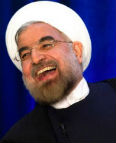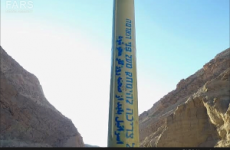U.S. Gen. Martin Dempsey: ‘I have military options if President Obama’s diplomacy fails’.
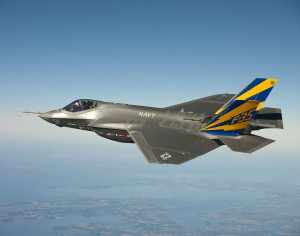
These are trying times for the Jewish state. First U.S. President Barack Obama offers to give A-Bombs to Iran on a silver platter, and then Russian President Vladimir Putin announces he is now ready to supply Tehran with a sophisticated S-300 air defense to protect them! It took the U.S. Senate’s Foreign Relations Committee to step in and remind Law Professor Obama about the ‘checks and balances’ of the U.S. Constitution designed to prevent a president from screwing up on foreign policy. Although the Senate’s intervention may have injected a sense of sanity into Obama’s dash for a deal with the Ayatollahs, it has not blocked Iran’s road to nuclear weapons; it will only make it more difficult and take longer – a detour along the way. At best, if the Iranians do not try and cheat again in the near future, this may be the Iranian game plan according to IDF (ret) Maj. Gen. Yaakov Amidror, a leading intelligence expert:
“The Iranians will scrupulously comply during the term of the forthcoming accord and rebuild their economy, bolster their regional status, strengthen their partners Hezbollah and others (Hamas, Houthi rebels in Yemen), deepen their nuclear research; and when the accord expires they will return to their nuclear weapons program with greater intensity.”
Writing in Israel Today, Amidror’s worst-case scenario is more in keeping with their track record:
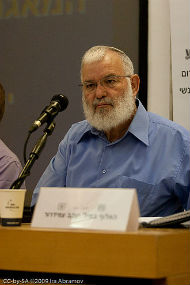
“The Iranians will wait for a suitable time (another international crisis such as Ukraine- DE) to violate the accord. Most certainly this will be after the sanctions have been lifted and many states will have invested in Iran, and thus have a keen interest in not harming their economic partner. The Americans promise the accord will give them an advance warning of one year to react to an Iranian break out and this will be guaranteed by a very credible and intrusive monitoring regime.”
Amidror and the vast majority of Israeli experts do not see a ghost of a chance that Iran will back off its drive for nuclear weapons. On the contrary, they will view the accord as an Obama climb-down from his previous promise that Iran will never be allowed to acquire A- Bombs.
What is most baffling is Obama’s mantra of no other alternative to compromising in a nuclear deal that will enable Iran to acquire A-Bombs in ten years. The Pentagon has released news about the successful development of a new Massive Ordnance Penetrator that packs a punch of fifteen tons! Such a payload would be capable of demolishing Iran’s underground nuclear facilities such as Fordow, which is built under a mountain (obviously for peaceful nuclear purposes only). The latest MOD was tested in January. In addition, Gen. Martin Dempsey, the Chairman of the U.S. Joint Chiefs of Staff, has also said publicly:
“The military option that I owe the President, to both encourage the diplomatic solution and if the diplomacy fails to ensure that Iran doesn’t achieve a nuclear weapon, is intact.”
We’ve known about the potential for the system to be sold to Iran for several years and have accounted for it in all our planning.
Moreover, Gen. Dempsey disclosed that Russia’s decision to supply Iran with S-300 missiles has not caught him napping:
“We’ve known about the potential for the system to be sold to Iran for several years and have accounted for it in all our planning.”
If this is the case, why is President Obama so gung ho on a deal with Iran at nearly any price, and had to be reined in at the last moment by his own Republican senators? In addition, Obama’s policy on Iran was subjected to a verbal drubbing in the Wall Street Journal by none other than Henry Kissinger and George Shultz. In any case, Obama will now be forced to take a tougher stand in the new round of negotiations that will hammer out the nuts and bolts of the nuclear agreement after the U.S. and Iran have expressed divergent opinions on the crucial issues of inspection and easing of the sanctions.
Obama’s disengagement policy has already created a power vacuum filled by Islamic State and the expanding of Iran’s influence in Iraq and Yemen.
The genesis of Obama’s approach can be traced back to the secret contacts he initiated with Tehran in 2013. Apparently the reelected president was determined that a nuclear deal with Iran would be the centerpiece of his foreign policy during his second term. At the same time, this would facilitate his overall goal of U.S. disengagement from the Middle East. Thus he conceived a package deal that included a precipitous withdrawal, against the advice of former Defense Secretaries Robert Gate and Leon Panetta as well as his top commander, David Petraeus. Obama brought Iran into the picture in Iraq and acquiesced in the major role being played by Iranian military support of Syrian tyrant Bashar Assad. But the biggest carrot for Iran’s cooperation was Obama’s offer to lift the sanctions that had Tehran hanging on the ropes of an economic decline. Iran would simply have to play lip service about their nuclear weapons program in return for slowing down its progress for possibly 10 years. In any case, Obama’s disengagement policy has already created a power vacuum filled by Islamic State and the expanding of Iran’s influence in Iraq and Yemen.
But it’s still early days in the ongoing process. If Obama again caves in the next round of nuclear talks with Iran, will the required 67 Senators reject it? At best, as President Obama has himself admitted, the proposed deal will permit Iran to go nuclear in ten years.
‘Those bastards the Russians!’
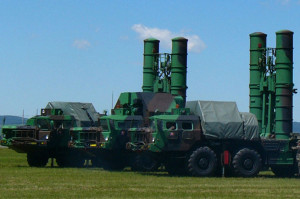
What can be said about Russian President Putin’s decision to fulfill the contract to supply Iran with advanced S-300 anti-aircraft missiles that are capable of intercepting aircraft and ballistic missiles at a range of 90 miles or some 150 kilometers? Tehran is obviously eager to deploy this system around their nuclear weapons sites in the hope of deterring a preventative strike by either Israel and/or the U.S. Eitan Ben Eliyahu, a former Israel Air Force commander, has said the S-300 will make it more difficult for Israel to launch an air strike on Iran, however Israeli pilots have long been training for such an operation.
The Israeli Air Force success in knocking out the SAM anti-aircraft batteries has sent shock waves throughout the entire Warsaw Pact in Eastern Europe. The SAMs constituted the backbone of the Soviet air defenses and they have been demolished in one day by the Israeli air strike.
President Putin be advised: During the First Lebanon War in 1981, the Syrian Army in Lebanon’s Bekaa Valley armed with the advanced Soviet SAM anti-aircraft batteries started tracking Israeli flying over Lebanon in the IDF’s battle with the PLO. The Israeli aircraft took on the SAMs. On one afternoon, the Israeli pilots destroyed 18 of the 19 SAM batteries without losing even one aircraft. And this personal note: several days later I interviewed IDF Gen. (ret) Chaim Herzog for Israel Radio. Herzog, a former Chief of IDF Intelligence said:
“The Israeli Air Force success in knocking out the SAM anti-aircraft batteries has sent shock waves throughout the entire Warsaw Pact in Eastern Europe. The SAMs constituted the backbone of the Soviet air defenses and they have been demolished in one day by the Israeli air strike.”
Obviously, the Israel Air Force had been doing its homework on the SAMs that had wreaked devastation on Israeli aircraft during the Yom Kippur of 1973. Later on I had the opportunity of asking a senior Air Force officer this question:
“The limited military confrontation with the Syrians during the first Lebanon War was not an all-out war with Syria, so maybe it was a strategic mistake in this side show for Israel to disclose that it had found a solution to the Soviet SAMs rather than saving it for an all our war with the Syrians when the result would be crucial?”
If Putin is putting his state-of-the art air defense on the line in Iran, he will be forcing the Israel Air Force to come up with effective counter-measures to neutralize it, if it hasn’t already.
The senior officer thought for a second and then replied with a Hebrew expression:
“Don’t worry, we’ve revealed a little but I assure you that we concealed far more!”
If Putin is putting his state-of-the art air defense on the line in Iran, he will be forcing the Israel Air Force to come up with effective counter-measures to neutralize it, if it hasn’t already.
In the wake of the ruckus over the Iranian nuclear deal, this nearly got through under the radar. Israeli pilots are now training in cockpit simulators of the new F-35 stealth fighter-bomber that is coming off the assembly at Lockheed Martin in the U.S. The first of the super-sophisticated jets are due to start arriving in Israel in December 2016. Steve Over, a senior at Lockheed Martin told reporters at Nevatim air base:
“The S-300 anti- aircraft system is exactly the type of threat the F-35 was designed to counter.”
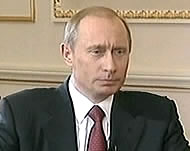
When news broke that Russia had decided to supply the S-300 system to Iran, Prime Minister Netanyahu telephoned Putin to protest. The Russian leader brushed off Netanyahu contending the missile system was only a defensive weapon. But it was only a matter of time that Russia fulfilled its contract with Tehran and jumped to the first in line of the countries that will be rushing to sign trade agreements with the Iranians once the sanctions are lifted. Whether it is Russia or the former Soviet Union, they always wind up in the corner of Israel’s enemies.
This also applies to Iran’s overall nuclear development that now poses such a peril to the Jewish state. After the Khomeini Revolution in 1979, work on a nuclear reactor that was started in the days of the Shah was suspended in light of the fanatical Islamist regime that rose to power in Tehran. Apparently Israel was one of the first countries to discover that Moscow had concluded a secret deal worth $800 million dollars to restart work on the Bushehr nuclear reactor. Personally, I heard about it at an ‘off record’ briefing to American visitors at the Sasha Institute that I was allowed to attend. A senior IDF intelligence officer dropped a bombshell by disclosing:
“We have information that those bastards the Russians have concluded an agreement with Iran to build the Bushehr nuclear! Where do the Russians think all of this is going to lead?”
Since the officer obviously thought his briefing was restricted and totally off record as well as his being unaware that a reporter was present I saw fit not to break the story, which burst into the headlines a short time later.


